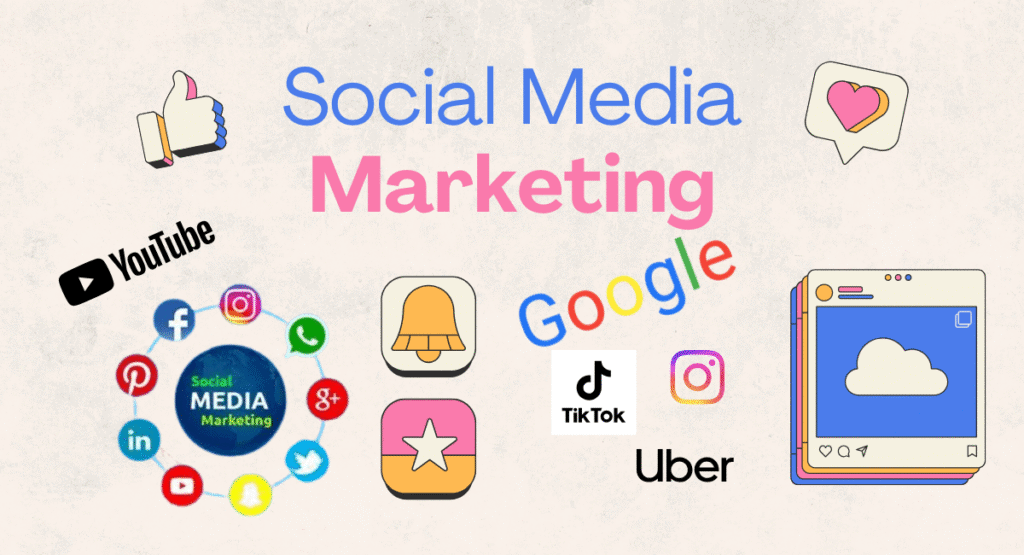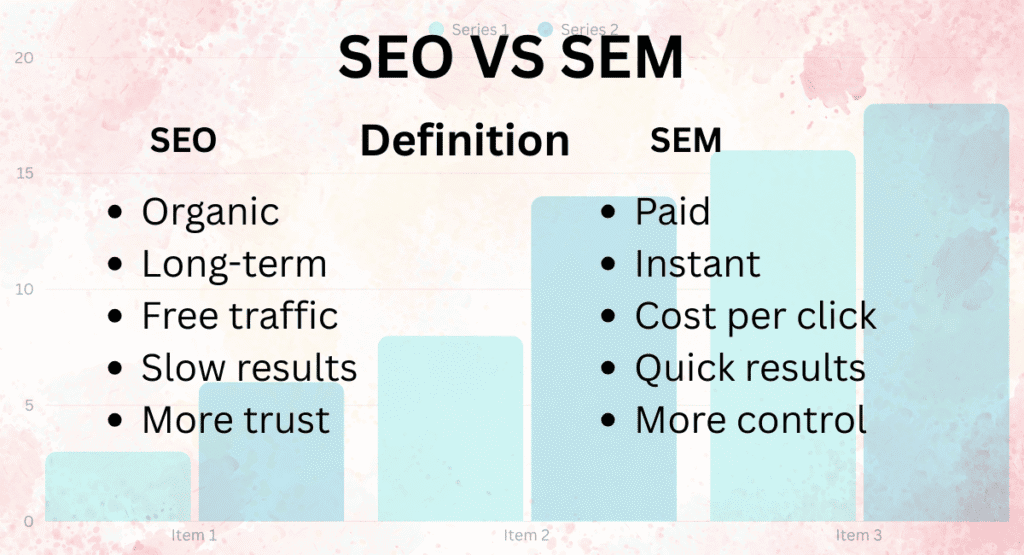Introduction
In today’s digital world, almost everyone is active on at least one social media platform. From scrolling through Facebook to watching reels on Instagram, or networking on LinkedIn to enjoying viral content on TikTok, social media has become a part of our daily life. But beyond personal use, social media is also a powerful tool for businesses, especially small businesses.
This is where social media marketing (SMM) comes into play. If you’re a small business owner, you might have wondered: What is social media marketing? How can it help me grow? And what are the benefits of social media marketing for small businesses?
This guide will answer all these questions in detail. By the end, you’ll understand how social media marketing for small business works, why it matters, and how to start building your own SMM strategy.

What is Social Media Marketing?
Social media marketing (SMM) is the process of promoting your brand, products, or services on social media platforms like Facebook, Instagram, LinkedIn, and TikTok to reach potential customers, engage with your audience, and drive sales.
Unlike traditional marketing methods such as newspaper ads or TV commercials, social media marketing is cost-effective, highly targeted, and measurable.
At its core, social media marketing involves:
- Creating and sharing content (posts, images, videos, reels, stories).
- Running paid advertisements to reach specific audiences.
- Engaging with users through likes, comments, shares, and messages.
- Building a loyal online community around your brand.
In simple terms, social media marketing for small businesses means using social media to create brand awareness, generate leads, and boost sales without needing a huge marketing budget.
Why Social Media Marketing is Important
1. Billions of Active Users
As of 2025, more than 4.9 billion people worldwide are using social media. This means your potential customers are already online. No matter what industry you’re in, there’s a high chance your target audience is scrolling through social media right now.
2. Cost-Effective Compared to Traditional Marketing
Running ads on TV, radio, or print is expensive and often not trackable. With social media marketing, even a small business with a limited budget can reach thousands of people through targeted campaigns.
3. Direct Engagement with Customers
Unlike traditional marketing, social media allows two-way communication. Customers can comment, ask questions, or message you directly. This builds trust and helps you understand what your customers really want.
4. Data-Driven Decisions
Social media platforms provide detailed insights into how your campaigns perform. You can track clicks, conversions, and customer behavior, which helps you refine your strategy for better results.
Platforms Overview: Facebook, Instagram, LinkedIn, TikTok
Every social media platform has its own style, audience, and purpose. Let’s quickly look at the most important ones for small businesses.
- Best for: Local businesses, small shops, service providers.
- Features: Business pages, Facebook Ads, groups, marketplace.
- Why: With billions of active users, Facebook is perfect for building awareness and targeting specific local communities.
- Best for: Fashion, food, beauty, lifestyle, creative businesses.
- Features: Stories, reels, hashtags, shopping features.
- Why: Visual content dominates Instagram, making it ideal for showcasing products and engaging younger audiences.
- Best for: B2B companies, consultants, professionals.
- Features: Company pages, professional networking, LinkedIn Ads.
- Why: LinkedIn is a professional platform where small businesses can connect with other businesses, hire employees, and build credibility.
TikTok
- Best for: Trend-driven businesses, brands targeting Gen Z and millennials.
- Features: Short-form videos, challenges, viral content.
- Why: TikTok offers incredible organic reach, meaning even small businesses can go viral without spending huge budgets.
Benefits of Social Media Marketing for Small Businesses
Now that you know what is social media marketing, let’s dive into why it’s a game-changer for small businesses
1. Increased Brand Awareness
One of the biggest benefits of social media marketing is visibility. Even if you’re a small bakery, boutique, or coaching center, your brand can reach thousands of people with just one viral post
2.Cost-Effective Marketing
Traditional advertising is costly, but social media marketing for small business allows you to run campaigns with as little as $5 per day. This makes it the most affordable way to promote your products or services.
3. Better Customer Engagement
When you respond to comments or messages, you build relationships. Customers feel valued and are more likely to choose your business over competitors.
4. Targeted Advertising
Social media platforms allow you to target specific demographics — age, location, interests, and behaviors. This means your ads reach the people who are most likely to buy from you.
5. Boosts Website Traffic & Sales
By linking your website in posts and ads, you can drive traffic to your online store or booking page. Many small businesses report that social media is one of their top sources of sales.
6. Builds Brand Loyalty
Consistent posting, storytelling, and engagement help you create an emotional connection with your audience. Loyal customers are more likely to recommend your business to friends and family.
7. Keeps You Competitive
Most businesses are already on social media. By not using it, you risk falling behind. A strong social media presence keeps you ahead of competitors and relevant in your market.
How to Start Social Media Marketing for Small Business
So, how do you begin? Here’s a step-by-step guide for beginners.
Step 1: Define Your Goals
Decide what you want from social media. Do you want more sales, more website traffic, or just brand awareness? Setting clear goals will guide your strategy.
Step 2: Identify Your Target Audience
Understand who your ideal customers are. What are their interests? Which platforms do they use? This will help you focus your efforts where it matters most
Step 3: Choose the Right Platforms
Don’t try to be everywhere. Start with 1–2 platforms where your audience spends the most time. For example, if you sell handmade jewelry, Instagram might be better than LinkedIn.
Step 4: Create Quality Content
Content is king. Share valuable, engaging posts — product photos, behind-the-scenes videos, customer testimonials, tips, or memes. Use a mix of images, reels, and stories.
Step 5: Be Consistent
Consistency is key in social media marketing. Post regularly, engage with followers, and stay active to build trust
Step 6: Use Paid Advertising
Start with a small budget for ads. Platforms like Facebook and Instagram allow hyper-targeted ads that give better ROI than traditional ads.
Step 7: Track and Improve
Use analytics tools (like Facebook Insights or Instagram Analytics) to measure your results. See what works and adjust your strategy accordingly.
Final Thoughts
If you’re a small business owner asking “What is social media marketing?”, the answer is simple: it’s the most affordable, effective, and powerful way to grow your business in the digital age.
The benefits of social media marketing for small businesses are undeniable — from boosting brand awareness to driving sales, engaging with customers, and staying ahead of competitors.
Start small, stay consistent, and focus on creating genuine connections with your audience. Over time, you’ll see how social media marketing for small business can transform your growth journey.
FAQ Section
1. What is social media marketing in simple words?
Social media marketing means using platforms like Facebook, Instagram, LinkedIn, or TikTok to promote your business, connect with customers, and increase sales.
2. Why is social media marketing important for small businesses?
It helps small businesses reach more people, build brand awareness, engage directly with customers, and grow sales without spending a huge budget.
3. Which social media platform is best for small businesses?
The best platform depends on your business type. For example:
- Facebook: local shops and services.
- Instagram: fashion, food, lifestyle.
- LinkedIn: B2B services and professionals.
- TikTok: trend-driven and creative brands.
4. How much does social media marketing cost for small businesses?
It can be free if you post content organically. Paid ads can start from as little as $5 per day, making it affordable for small businesses.
5. How can a small business start social media marketing?
Start by defining your goals, choosing the right platforms, creating engaging content, posting consistently, and running small-budget ads.

